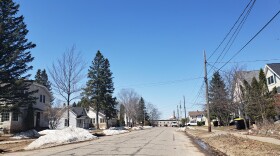Rhinelander City Forester Tom Jerow walks down Cranberry Lane in the city’s west side checking on trees the city planted last year.
“This is mountain ash, a great pollinator species that we will be planting,” said Jerow while touching the bright red berries of a tree that is about two feet taller than him right now. “The fruit is good for birds, which is another thing trees do is provide wildlife habitat.”
The low-income neighborhood at one point had plenty of trees to shade sidewalks and homes, but many of them have been lost to disease and invasive species like Dutch Elm Disease and Emerald Ash Borer.
The city received a $25,000 matching grant last year that allowed for 150 trees to be planted.
Those funds were used, in part, to plant a diversity of trees in the boulevards of neighborhoods like those in the west side to help mitigate similar disease problems in the future. The mountain ash, for example, was planted because it’s resistant to emerald ash borer.
“Diversity is really important for that next disease that we don't know about. You've got to have a diverse urban canopy in order to get through those next diseases, and with climate change, we will be seeing more diseases,” said Jerow.
Some of those challenges are already presenting themselves, invasive Japanese beetles have been munching on some of the trees.
The whiplash of last year’s drought when the trees were planted to this year’s heavy rains aren’t great for tree health.
“This is from the drought, so we'll prune this out,” said Jerow pointing out some discolored leaves on one tree. “But still, trees still survive.”
The benefits of urban trees
In five to 10 years this neighborhood will have the full benefits of those trees.
A 2021 study found urban trees had a range of environmental and health benefits that can help communities adapt to climate change.
“They clean the air we breathe, they filter the water that runs off and clean our water in communities that have tree lined streets, health outcomes are better because people get out and walk more because it's shaded,” said Jerow.
Urban Forestry Grant
Jerow will be able to plant even more trees starting next year after the city received a $182,000 grant. The money comes from the state’s Urban Forestry Grant program which is funded by the Inflation Reduction Act.
The two-year grant will set out to accomplish several goals.
One is to remove dead and dying trees that pose a health risk to people. For every tree the city removes, two will be planted in its place.
The funds will help pay for a contractor to do the planting, an important factor as the city has limited resources to plant trees at this scale.
“Part of our problem is that, you know, we don't have the infrastructure to support a vibrant tree program. It's why we qualified for this grant. These will be planted by a contractor next year,” said Jerow, who volunteers his time.

Jerow says it’s still in the planning stages, but the goal is to plant trees in areas where canopy is sparse and focus on planting pollinator trees.
“We can't plant all pollinators because it's really, really important to plant a diverse number of species, but we did want to pay particular attention to that, because, again, pollinators are having difficulty,” said Jerow. “A lot of people think of cone flowers and stuff like that, but actually trees are also great pollinator species, so it won't be all pollinators, but we're going to concentrate on pollinators.”
There are also plans to plant about 25 trees to create a food forest.
Jerow says the work will be done in partnership with the Rhinelander Area Food Pantry to help with food security.
“These will be trees planted in accessible areas where the public can harvest the fruit or not, or whatever part of the tree is used,” said Jerow.
That project likely won’t start until the second year of the grant in 2026.
Planting on the other tree projects will start next year. Work will be done on both private and city property.
“We can almost put a tree anywhere, as long as it's the right tree in the right spot,” said Jerow.





